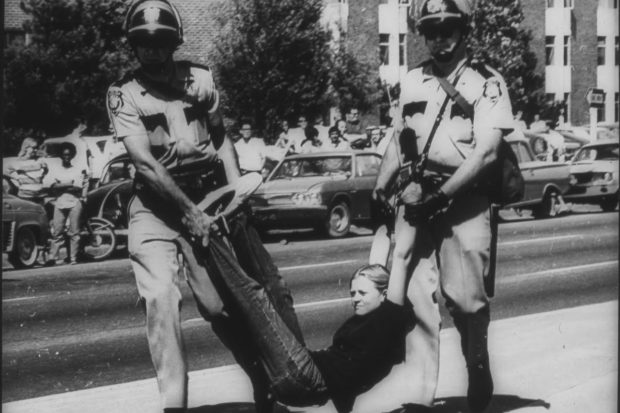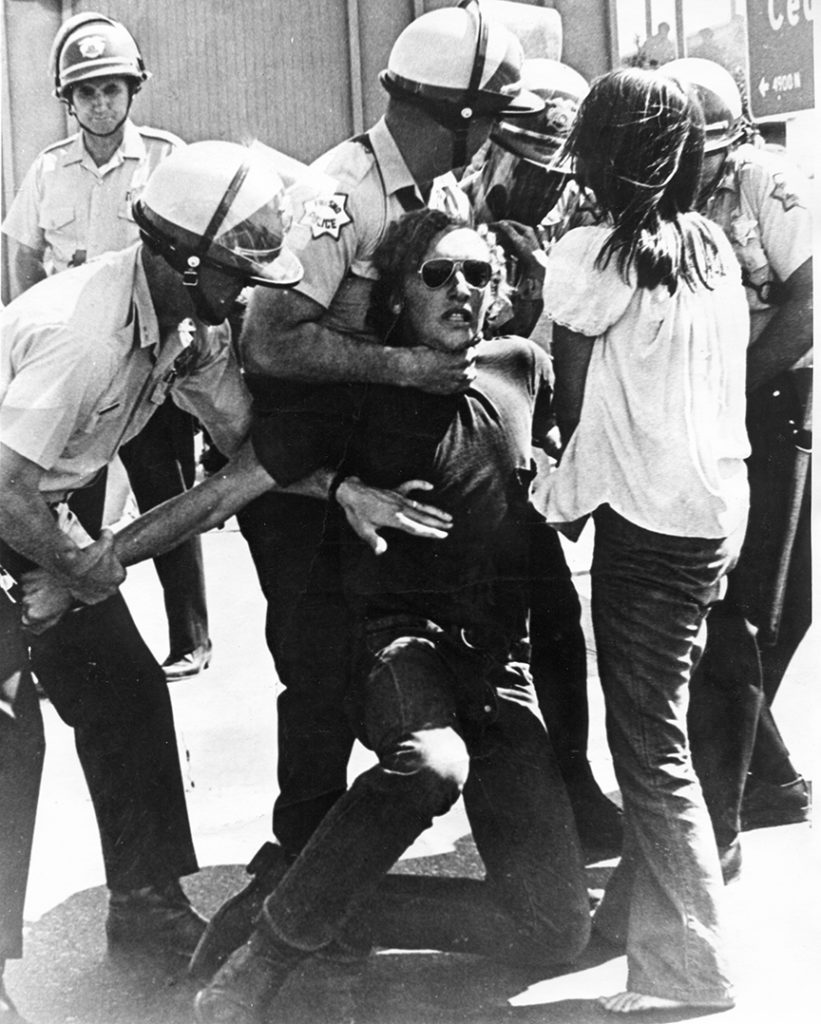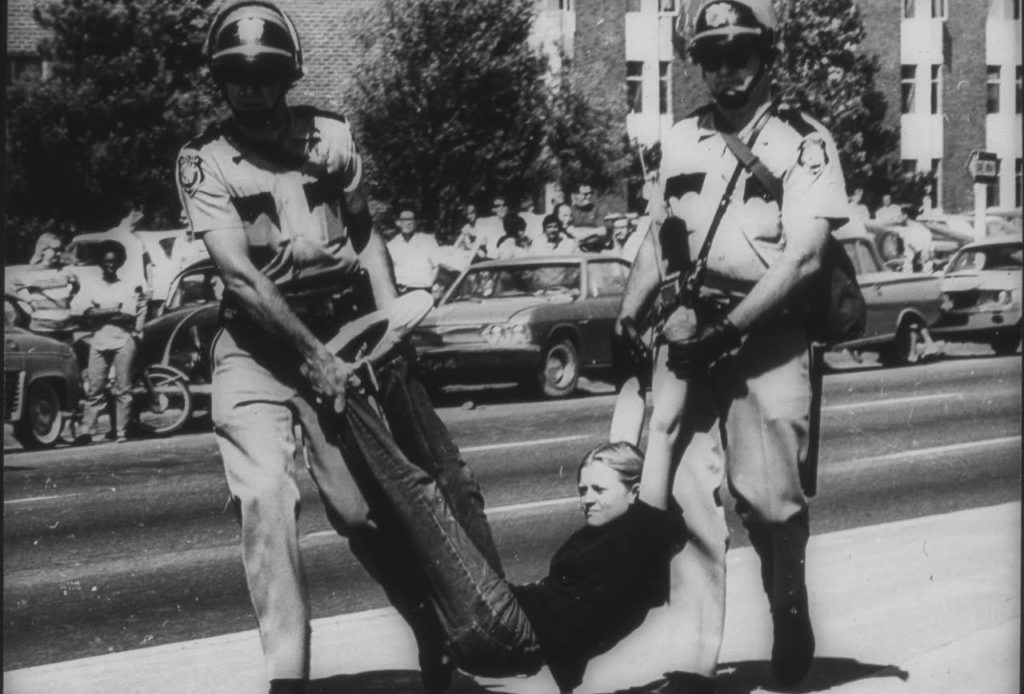
By Mike Rhodes
May 2020 marks the 50th anniversary of a social and political upheaval that changed how some people saw this sleepy little town. Shaw Avenue south of Fresno State was shut down by antiwar activists protesting the Vietnam War. The computer lab on campus and the local draft board were bombed. Students and faculty were in open rebellion against the “establishment.”
Joel Eis has written a book that talks about those days in Fresno that almost no one has heard about. For example, Eis tells us about one memorable instance of being harassed by government agents while at housing used by members of the Fresno Draft Resistance in a fig orchard near First Street and Sierra Avenue:
The next day was Saturday. At seven o’clock in the morning, Karen and I (in separate rooms) were awakened by the punishing WHUMP! WHUMP! sound of a US Army Huey helicopter hovering less than three-hundred feet off the ground, directly over my house in the middle of the fig orchard. The din was so loud that Karen and I—the only people in the house—had to yell at each other, head-to-head, in order to be heard. The chopper was pitched over on its side and a soldier was strapped in the side gun turret with a camera, taking pictures of our house.
The reason for this special attention was that we were part of the antiwar movement in Fresno, California. As far as they were concerned, we might have been “peaceniks,” but for them we were the Enemy, and therefore a legitimate target for harassment. I didn’t know what to do.
Karen said, “I know how to get them to come closer.”
She went to the upstairs room and climbed out onto the roof of the house. She was an attractive, well-built young woman. Karen took off her blouse and showed the Army boys what they were fighting to protect. The excited photographer signaled the pilot, and the chopper was soon another fifty feet lower. I could almost read the soldier’s name over his pocket as he slammed away with the camera, taking pictures of Karen.

Karen slowly reached into a window of the bedroom near her perch on the roof and pulled Paul’s M1-carbine automatic rifle out through the window, then opened fire on the chopper. Shells flew away from her bare arms, torso, and shoulders as fast as she could pull the trigger.
She got off eight or ten rounds before the army retreated.
Totally stunned by her action, I yelled, “What the hell did you do that for? Now they’re gonna be out here to bust us!”
Putting her shirt back on, Karen yelled down, “Doubt it. They’d have to explain what the fuck the Army was doing takin’ pictures of us from a chopper in the first place.”
The Army must have figured it out the way Karen did.
The cops never showed up.
That was an excerpt from Eis’s book Standin’ in a Hard Rain: The Making of a 1960s Revolutionary (being published soon) that reminds us what life was like in Fresno during the struggle to end the Vietnam War. There was also music, potlucks at the Resistance House and lots of good times.
In June 2019, antiwar/draft resistance activists gathered for a reunion at Fresno’s Unitarian Universalist Church. Don Teeter, who remains a revolutionary to this day, speaking at the event, talked about how hopeful people were at that time. There was a feeling that the youth led movement would change the world.

Teeter said, “I remember that the revolution seemed so close at hand and I was driving up to San Francisco with a friend, going to some demonstration, with this guy who was kind of wealthy, and he said, ‘I’m thinking about buying my next car, a Porsche, but I’m not sure I should because I might not be able to get parts after the revolution.’ That’s how close it was,” Teeter said.
The reunion event was attended by more than 200 people and featured the wonderful music of Agustín Lira and Patricia Wells and included speaker David Harris. Harris graduated from Fresno High in the mid-1960s and went on to become a national leader of the Draft Resistance movement, married folk singer Joan Baez and spent more than a year in prison for his opposition to the immoral and unjustifiable war in Vietnam.
How did the youth of today react to these stories of the days in Fresno when revolution seemed like an inevitability. Kayla Moon, who was at the 50 Years of Resistance event, related what she thought.
Moon said, “In my generation, we see activism in the now but we haven’t had the time for our work to unfold into a larger historical context. This event was incredibly meaningful because I found activism is relevant at any time and has long and profound effects.
“One of the greatest things that stood out to me was that Fresno State used to be incredibly White-centric and only a small number of the Latino population attended due to systemic injustices. Due to Chicano grassroots activism, Fresno State’s largest population is our Latino community, a great success.
“It was also incredible to see the antiwar movement succeed in eliminating the draft in its entirety. Activism is always relevant, so get involved.”
This event was sponsored by Peace Fresno, the Fresno Center for Nonviolence, the Human Rights Coalition of the Central Valley, the Women’s International League for Peace and Freedom, the Unitarian Universalist Church and the Community Media Access Collaborative and was supported by this newspaper.
*****
Mike Rhodes is a writer for the Community Alliance newspaper and helped organize the 50 Years of Resistance event. Contact him at mikerhodes@comcast.net.
Resources
If you missed 50 Years of Resistance and would like to see all of the speakers and musicians, it is available online through the Community Media Access Collaborative in Fresno (https://cmac.tv/show/50-years-of-resistance-in-fresno/) or on DVD. Contact Mike Rhodes at mikerrhodes@comcast.net to get a copy of the DVD.
For more information about the turmoil on campus in 1970, read The Slow Death of Fresno State by Kenneth Seib. Rych Withers, executive director at the Fresno Free College Foundation and KFCF (www.kfcf.org), can tell you how to get a copy of the book.
You can also see the start of an archive on the Fresno draft resistance/antiwar movement at http://mikerhodes.us/may-22-1970/.
Advertising


[…] story “Fresno, a Hotbed of Radicalism,” written by Mike Rhodes for the May edition of the Community Alliance online sparked lots of […]